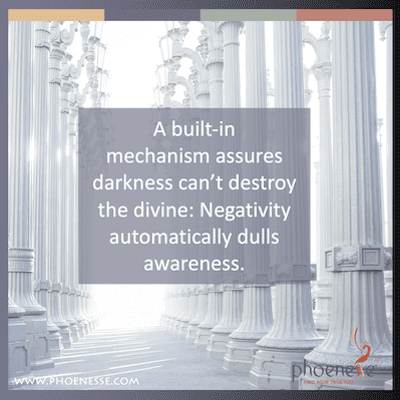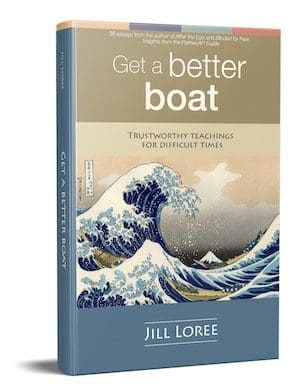
A built-in mechanism assures darkness can’t destroy the divine: Negativity automatically dulls awareness.
For many, there’s a gap between what we say we want in life—fulfillment, satisfaction, success, happiness, peace—and what we’re actually getting out of life—confusion, frustration, tension, exhaustion. Why is there this gap? And really, why bother trying to close the gap if, in the end, it seems like darkness will keep winning anyways?
In Chapter 10 of After the Ego, the Pathwork Guide explains that, no, ultimately darkness will not destroy us all. Although temporarily it can do a nice job of spoiling our picnic. The reason that darkness can’t win in the long run is simply this: The greater our darkness, or negativity, the lower our awareness.
Consider the fact that if consciousness was allowed to expand—if people were able to wake up—and self-purification was not a necessary, simultaneous part of that process, then evil could indeed destroy the divine. So there’s a built-in mechanism to assure that never happens: Negativity automatically dulls awareness.
In other words, opting to remain in the dark about our own negativity closes off our ability to perceive what’s going on in and around us. As a result, blindness, deafness, dumbness and numbness set in. And these don’t just happen in our bodies. They’re happening inside us. In fact, as is always the case, our outer experience is just a reflection of what’s going on within.
When we are steeped in negativity:
-
- We can’t hear our wiser Higher Self voice—also known as guidance or intuition—speaking to us
-
- It’s a struggle to speak our own truth
-
- We’re disconnected from our own feelings, so our own immature behavior is confusing to us
-
- We can’t see how we are contributing to our struggles
-
- We can’t see what others are doing with their negativity to deceive us or harm us
In such a limited state, we are not only quite ignorant, we are also quite powerless. For we are cut off from the center of our being where divine light always shines and all of life is in connection. The only way to come out of our darkened state is through our consistent effort to get to know ourselves.
Know thyself
Developmentally speaking, humans are in the state of consciousness where there is at least some self-awareness. This means we realize we can affect others with our decisions and behaviors. It also means we’re at the point of taking self-responsibility. After all, humans don’t operate according to instincts but rather according to our own choices.
For example, we can use our free will to express ourselves. And we tend to do so in whatever way aligns with our current level of development. Clearly, for humans, these levels are all over the map. We’re all made of both goodness and darkness, and it’s just a question of which part is in the lead in each moment. Most of us are somewhere in the middle. But we’re all souls that are not yet fully purified.
As we clear away our negativity, more power will be available to us.
When we’re lower in spiritual development, the untapped potency of our consciousness will be protected by our lack of awareness. For if we were aware of how much power we have to create while we are still swimming in negativity, we would cause more harm than we already do.
Instead, our own negativity mires us in disharmony. Our unpleasant life experiences then become our medicine. If we face into them and unwind them, we’ll start healing. That’s what starts closing the gap.
Then, as we clear away our negativity—by clearing away our faults—more and more power will be available to us. For the more inner housecleaning we do, the more we live in truth. And living in truth is synonymous with living in peace and harmony. And these of course lead to having happy, fulfilling and satisfying lives.
The question is: How do we clear away our negativity and close this gap?
The four big God-blockers
There are four big God-blockers we need to find and clean up. The first three are pride, self-will and fear. The fourth is shame. Here’s how they fit together.
There is a certain layer in our psyche between our physical body and our divine spark, or Higher Self. And the ego—with all its vanity, pride, fear and ambition—exists in this layer. It is in this layer that our longing for love transposes into a longing to receive love. This ego layer believes there’s nothing better than receiving love without taking any risk that we’ll get hurt. So for the ego, remaining aloof and detached is a highly desirable state.
If we had no shortcomings, we would have no fear.
This is the origin of pride, which essentially says “I am better” and “I am separate.” With these sentiments tucked under our belt, we don’t believe we can ever be loved, accepted, seen and respected the way we want. Actually, we’re right about this, because love can’t come to those who hold themselves back and won’t give.
This leads to the untrue belief that we are not lovable. And this causes us to feel unhealthy shame that there is something wrong with us: We’re not good enough, we’re not lovable, we don’t matter.
This wrong thinking leads us to use our self-will to demand love and respect. We’ll force others both overtly, using aggression, and covertly, using submission. But love can’t come this way, which is why none of our strategies ever work. This causes us to withhold ourselves even more.
Then fear says “I’ll never get it!” “It” is essentially love, but this often spreads out to include all the things we have swapped out for love, hoping these things will bring us the fulfillment we now crave. In our growing fear that we’ll never get our needs met, tension and anxiety build.
In truth, if we had no shortcomings, we would have no fear. And it’s fear that makes us so miserable. This same fear blinds us to how joyful life can be. But using the tools that the Pathwork Guide is giving us, we have the ability to break the chains of fear.
Introducing guilt and shame
Part of us, deep in our belly, has known all along that none of our wrong beliefs are in truth. Such wrong beliefs include: we aren’t good enough, we are not lovable, or we don’t matter. And from that gap between our current beliefs and our deep inner truth, guilt arises. This is a false guilt, for if it were authentic guilt for something we had done wrong, the answer would be genuine remorse. Instead, we’re left with gnawing guilt that eats at us relentlessly from the inside.
Similarly, if our shame were the right kind, the answer would be repentance. This kind of healthy shame motivates us to do our self-healing work. The wrong kind of shame leads us further into darkness because it makes us want to hide. And this does not help us at all in untangling these twisted threads.
Overcoming darkness
When we expand our awareness, we are letting in more spiritual light. But this spiritual light cannot come to us from outside ourselves; it can only arise from within. This light, however, cannot penetrate our pride. For pride is to spiritual light what a concrete wall is to physical light. This is how pride acts to dim the light of our awareness and wisdom.
So we must be on the lookout for pride. Pride is the feeling that we’re special, either because we’re better than others or less than others. For feeling less than is just the flip side of feeling better than. And since pride is always an element in our triad of faults, if we find pride, we should also search for fear and self-will. And when we find them all, we’ll discover shame and guilt are also nearby.
With all four God-Blockers present, we will be living inside a tangled web of confusion that creates big gaps in our awareness. Because the light cannot get through. This is what’s behind the darkness we must work so hard to overcome. And while darkness will not win in the end, it sure can make us miserable in the meantime.
–Jill Loree

We can heal | AFTER THE EGO • BLINDED BY FEAR
The Real. Clear. series | HOLY MOLY • FINDING GOLD • BIBLE ME THIS • THE PULL • PEARLS • GEMS • BONES • NUTSHELLS
The Self. Care. series | SPILLING THE SCRIPT • HEALING THE HURT • DOING THE WORK
More spiritual books | WALKER (a memoir) • SPIRITUAL LAWS • WORD FOR WORD • KEYS (Pathwork Q&As)


